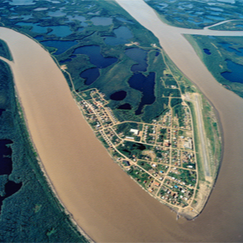Aklavik, Inuvialuit
Year(s) Funded: 2010-2011
Topic Area: Adaptation Planning Contact: Billy Archie, Jerome Gordon, Michelle Gruben Partners: Aklavik Hunter’s & Trapper’s Committee ([email protected]) Website: http://www.aklavik.ca Title: Aklavik Elders' Traditional Knowledge, Climate Change and Community Health
Action: Traditional local knowledge from Inuvialuit and Gwich’in Elder’s on their observations and experiences during traditional harvesting activities was gathered to identify links to climate change. Community concerns were focused on potential implications of a changing/contaminated environment and its impact on human health. Documentation of the population of species such as char, caribou, muskrat and muskox in traditional harvesting areas was critical to understanding the context of climate change. Acquiring this information helped the community to plan and manage their traditional harvesting practices and ensure healthy traditional food consumption activities. A series of activities, including interviews, surveys, group sessions, meetings and cultural activities, were conducted with Elders and hunters to collect traditional knowledge. Results: Capacity building was a key focus of the project, ensuring members of the research team gained skills and knowledge in scientific research data collection. The participants and community members benefited from learning about and understanding how research is conducted and how it can contribute to broader management initiatives. The study helped increase awareness of healthy lifestyle behaviors, practices, and choices related to climate change. Some key findings include: Spring comes earlier/melts faster; Freeze up is later/longer to freeze; Changes have been observed for the last 10 to 15 years; Increase in beaver, leading to too many dams; Lots of moose in the Delta & Coast; Not much caribou this year; Weather is harder to predict; Increasing difficulty for caribou to find food; Birds are believed to be benefitting the most from climate change. Outputs: The traditional knowledge and cultural activities observed were recorded, analyzed and used to develop a database on traditional knowledge that community members can now use to help make informed decisions related to health, safety and wellness. |
